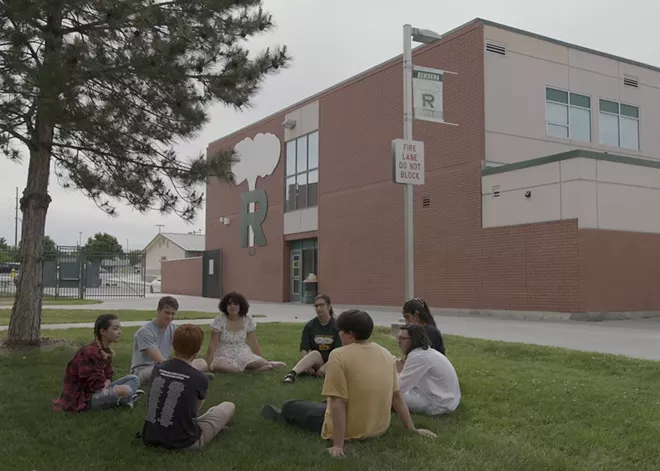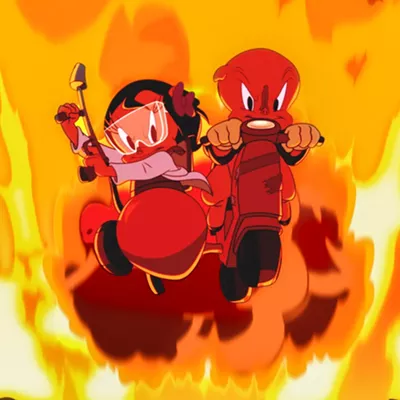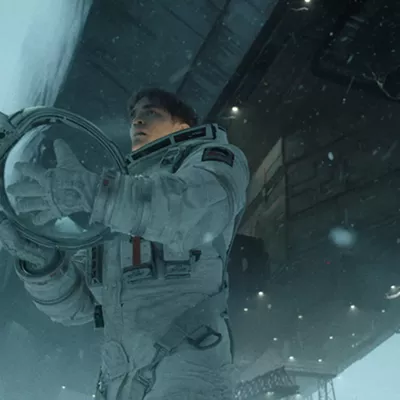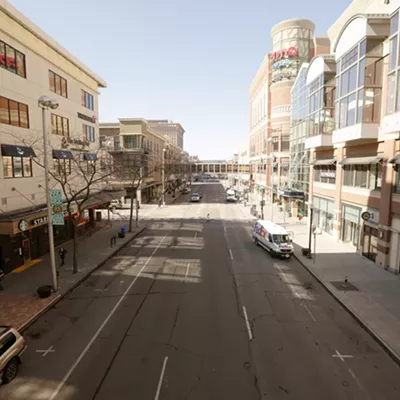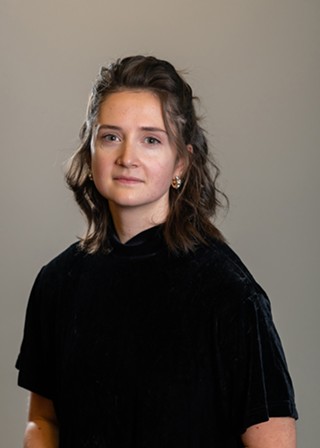A high school football team rushes the field, decked out in green jerseys with gold lettering. Their helmets have typical face guards on the front but yellow airplanes on the back. Superfans fly a banner that reads "Welcome to Bomber Territory." The back of the coach's jacket depicts an atomic cloud blooming above a capital R. An R for Richland.
Documentarian Irene Lusztig has no interest in easy answers. Take the filmmaker's first feature film — 2002's Reconstruction — which investigated her own family's history before fleeing Nicolae Ceausescu's Romania. Her new documentary Richland turns a similarly curious, compassionate lens to the small Washington town drenched in international controversy.
Most children who grew up in Richland in the 1940s had a mother or father who worked in "the area," the local shorthand to refer to the Hanford Site, a nuclear reactor that manufactured plutonium for atomic weapons. Richland was a bedroom community lined with rows of "alphabet homes," prefabricated homes that made life in the commuter town that much simpler.
At the height of World War II, it was that certain brand of idealized Americana at its finest: suburban neighborhoods, Fourth of July parades, sporting events, casseroles and the entrenched feeling that they were doing something to help America win the war. Never mind that the "something" was nebulous to most Richland residents, especially the wives and kids who didn't realize, or didn't want to realize, that a world-changing killing machine relied on the work being done in their own backyard.
A heavier hand than Lusztig's might force the contrast, hammering the story of a naive, optimistic America versus the impending violence that would ravage Nagasaki and Hiroshima and change global politics forever. They might bluntly pair the idyllic Americana with the environmental destruction Hanford was wreaking across southeastern Washington. But instead of setting up simple dichotomies, Lusztig forays into the world of tensions and contradictions where art lives, breathes, provokes and heals.
Richland is a beautiful portrait of a broken place, without final judgments about what is right and wrong. Visually, it's a slow meditation on barrenness, violence, stillness and rebirth. The camera lingers on desert art installments by artist Yukiyo Kawano, a third-generation hibakusha (the Japanese term for anyone suffering the lingering effects of an atomic bomb). Later, it pans across to an Indigenous family suffering the radiation contamination of their ancestral land. Between still shots, it follows Richland residents through the seemingly mundane — walks through parks, neighborhoods, bowling alleys and cafes — tracing how each place and person is altered by the town's atomic history.
Conversations touch on guilt, pride, current American politics, reparations, health, greed, love and memory. Church choirs and folk duos sing about climate change, childhood and sin. High school students sit in the grass and talk about their mascot, the atomic cloud, and whether it's the best way to represent Richland High. The history is plain — the atomic bomb created this community... but it destroyed so much else. Is it time to disassociate? Is that even possible?
Confronting death and denial head on is the only way to find a way forward, Lusztig suggests. History and place are central to our identity, but human ingenuity and collaboration changed this place forever. Which, then, defines Richland and its residents more?
"We were just taught to be proud of the area," one Richland resident says. "We did an amazing, terrible thing. But people drop the 'terrible.'" ♦
Richland screens as part of the International Uranium Film Festival at the Magic Lantern on April 4 at 6:25 pm (with a post-screening a Q&A with Lusztig). Richland continues at the Magic Lantern through April 11.
